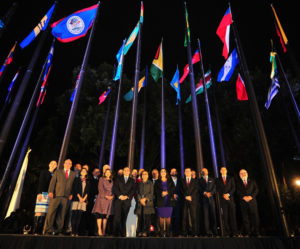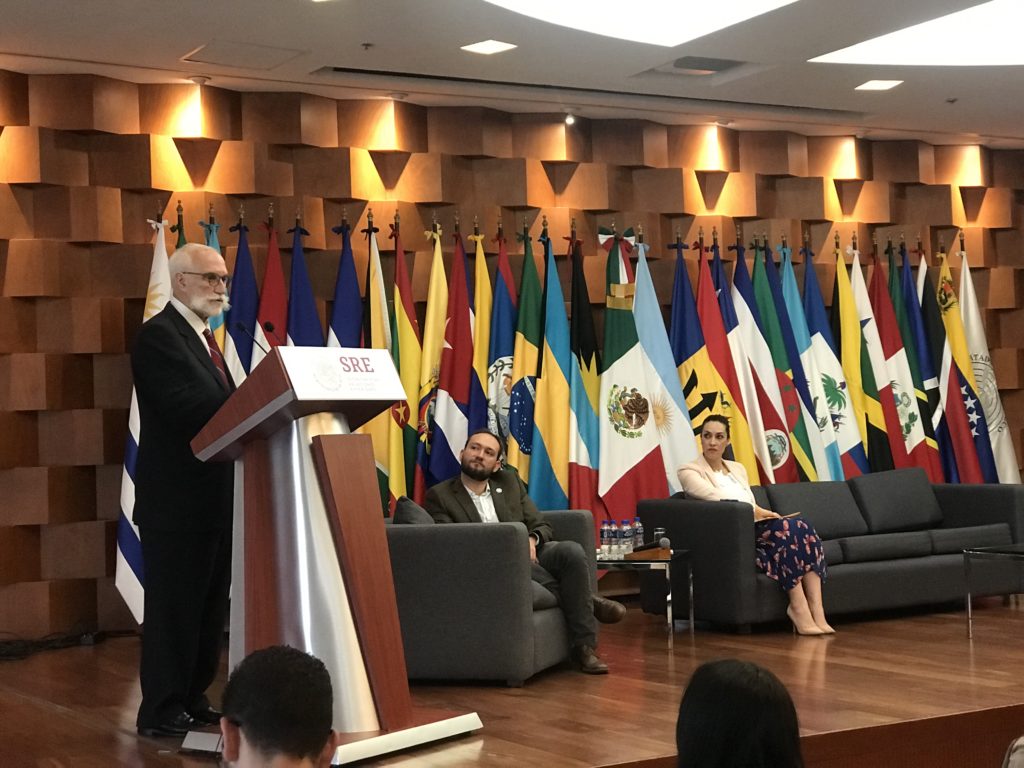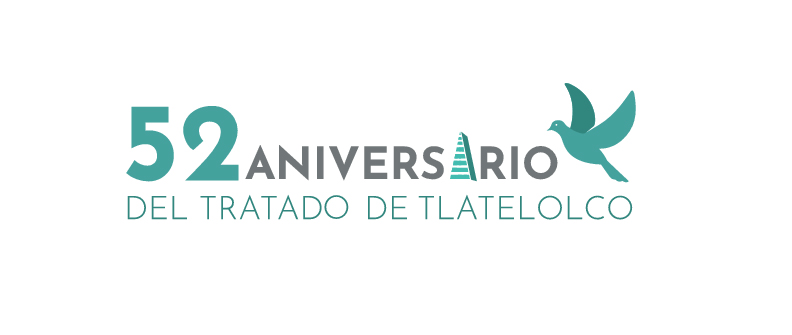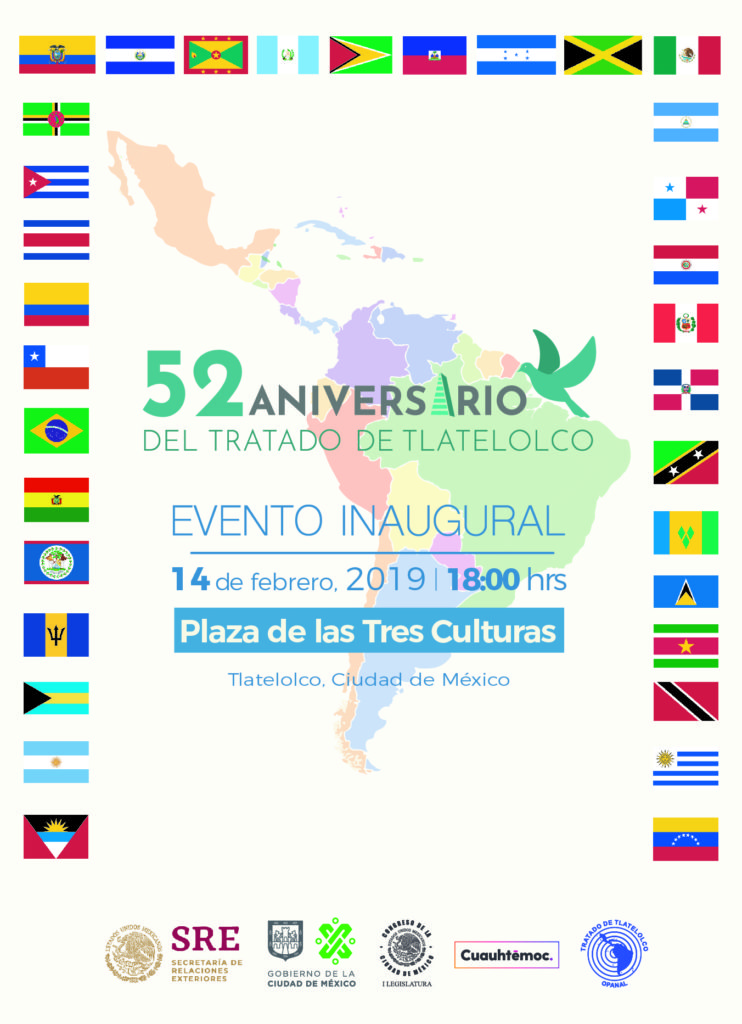On February 14, 15 and 16, 2019, the Member States of OPANAL celebrated the 52nd Anniversary of the adoption and opening of signature of the Treaty for the Prohibition of Nuclear Weapons in Latin America and the Caribbean (Treaty of Tlatelolco).
Communiqué of the 33 Member States of OPANAL
As every year, on February 14, 2019, the 33 Member States of OPANAL issued a joint communiqué in which, apart from commemorating the 52nd Anniversary of the Treaty of Tlatelolco and the 50th Anniversary of the Agency, they stressed:
their concern about the international situation, which, among other aspects, is characterized by continuing programs for the modernization of nuclear arsenals, the possible creation of new types of nuclear weapons delivery systems and the increasing threat of use of nuclear weapons in a context of tensions and armed conflicts and threats of terrorism. This occurs when there still are States possessing nuclear weapons, many of those on alert status.
As creators of the first nuclear-weapon-free zone in a densely populated region of the Earth, the Member States of OPANAL also highlighted in their communique the importance of promoting cooperation with the Parties and Signatories of the Treaties that established Nuclear-Weapon-Free Zones in the South Pacific, in Southeast Asia, in Africa and in Central Asia and also with Mongolia whose nuclear-weapon-free status is recognized by the United Nations. In that sense, they affirmed:
their commitment to contribute to the success of the Fourth Conference of Nuclear-Weapon-Free Zones and Mongolia, in 2020, convened on 5 December 2018 by Resolution 73/71 of the United Nations General Assembly, and, in this regard, urge all the Parties and Signatories of the Treaties that establish Nuclear-Weapon-Free Zones to participate actively in the preparation of the Fourth Conference, supporting Mongolia, designated coordinator of the Fourth Conference.
Commemoration in Plaza de las Tres Culturas, Tlatelolco

Ambassadors and Representatives of the Member States of OPANAL in Plaza de las Tres Culturas, Tlatelolco.
On the initiative of the Congress of Mexico City, in collaboration with the Government of Mexico City, the Mayor's Office of Cuauhtémoc (Mexico City), the Ministry of Foreign Affairs of Mexico and OPANAL, cultural activities were held in the Plaza de las Tres Culturas, in the Tlatelolco neighborhood, to commemorate the 52nd Anniversary of the Treaty of Tlatelolco.
On February 14, a ceremony was held to raise the flags of the 33 Member States of OPANAL in the Plaza de las Tres Culturas. The event was attended by Ambassadors and Representatives of the States of Latin America and the Caribbean, as well as congressmen, authorities of Mexico City and the Mayor's Office of Cuauhtémoc.
At the inauguration of the ceremony, some words were addressed by Congressman Marco Antonio Temístocles Villanueva Ramos, President of the Human Rights Commission of the Congress of Mexico City; Congresswoman Jannete Elizabeth Guerrero Maya, President of the International Affairs Committee of the Mexico City Congress; Mr. Maximiliano Reyes Zúñiga, Undersecretary for Latin America and the Caribbean of the Mexican Ministry of Foreign Affairs; Mr. Néstor Núñez López, Mayor of Cuauhtémoc; Dr. José Alfonso Suárez del Real and Aguilera, Secretary of Culture of the Government of Mexico City; and the Hon. Mr. Mauricio Carvalho Lyrio, Ambassador of Brazil in Mexico and current President of the Council of OPANAL.
In his speech, Ambassador Carvalho Lyrio mentioned that:
el Tratado de Tlatelolco es obra de la voluntad política de los Estados de la región que decidieron reemplazar el dilema de la seguridad con la seguridad y la cooperación. De hecho, el Tratado de Tlatelolco es uno de los elementos que explica que a lo largo de los años las relaciones entre nuestros Estados se han caracterizado sobre todo por la amistad. Al declarar la América Latina y el Caribe como una Zona Libre de Armas Nucleares, nuestros países demostraron la determinación de romper con la lógica perversa que dominaba el pensamiento de la Guerra Fría. Esa iniciativa inspiró a otras regiones a seguir por el mismo camino. Después de Tlatelolco, siguieron los Tratados de Rarotonga, Bangkok, Pelindaba y Semipalatinsk.
In the presence of special guests and residents of Tlatelolco, OPANAL also inaugurated the photographic exhibition "52º Anniversary of the Treaty of Tlatelolco", which contained a selection of more than 20 photographs provided by the Secretariat of OPANAL and by the Historical Archive of the Ministry of Foreign Affairs of Mexico.
On February 15 and 16, thanks to the collaboration of Embassies of OPANAL Member States, the residents of Tlatelolco enjoyed a musical program from Bolivia, Ecuador, Guatemala, Mexico and Uruguay, as well as a gastronomic show from Bolivia, Cuba, Mexico, Nicaragua and Peru.
Lecture forum on the Treaty of Tlatelolco

From left to right: Amb. Luiz Filipe de Macedo Soares (Secretary-General of OPANAL); Congressman Marco Antonio Temístocles Villanueva Ramos (President of the Human Rights Commission of the Congress of Mexico City); and Congresswoman Jannete Elizabeth Guerrero Maya (President of the International Affairs Commission of the Congress of Mexico City).
On February 15, 2019, the Ministry of Foreign Affairs of Mexico hosted the lecture forum of the 52nd Anniversary of the Treaty of Tlatelolco.
Ambassador Luiz Filipe de Macedo Soares, Secretary-General of OPANAL, and Ambassador Emeritus of Mexico Sergio González Gálvez, former Undersecretary of Foreign Affairs of Mexico, participated in the panel on "The antecedents of the Treaty of Tlatelolco".
In the second panel, the Hon. Mr. Mauricio Carvalho Lyrio, Ambassador of Brazil to Mexico and President of the Council of OPANAL, as well as Dr. Athanasios Hristoulas, Research Professor of the Instituto Tecnológico Autónomo de México.
During his conference, the Secretary-General of OPANAL presented his vision on the importance of the Treaty of Tlatelolco and OPANAL:
Es siempre interesante rememorar que el Tratado de Tlatelolco fue el primer instrumento jurídico que prohibió las armas nucleares. No obstante, el texto del Tratado de Tlatelolco dejó claro que el objetivo último es lograr un mundo sin armas nucleares.
El Organismo para la Proscripción de las Armas Nucleares en la América Latina y el Caribe (OPANAL), que este año está conmemorando su jubileo de oro, sigue ejecutando la labor de garantizar que en toda el área de aplicación del Tratado de Tlatelolco no haya armas nucleares. Por eso, el OPANAL no es un organismo intergubernamental volcado hacia adentro de la región. Sigue siendo, y yo diría crecientemente, una institución que ayuda a la expresión de todos los países de la región hacia afuera en términos de los temas de desarme de armas nucleares y de no proliferación.
Ayer, 14 de febrero de 2019, como hacemos desde hace años, emitimos los 33 Estados Parte en el Tratado de Tlatelolco y Miembros del OPANAL un comunicado. Ese comunicado contiene nuestra posición sobre una cantidad de puntos y problemas que no se restringen a nuestra región.
Regarding the work of OPANAL as a regional forum for the articulation of joint positions, the Secretary-General affirmed:
Ese ejercicio de expresión es, desde 2014, repetido cada 26 de septiembre, procalamado por la Asamblea General de las Naciones Unidas como el Día Internacional para la Eliminación de las Armas Nucleares.
Ninguna otra región en el mundo hace este tipo de manifestación conjunta. Eso pone al OPANAL a la vanguardia de la discusión sobre las armas nucleares. El OPANAL es así un elemento muy importante en las relaciones latinoamericanas y caribeñas.
Finally, the Secretary-General referred to the current international situation regarding nuclear weapons:
La tensión internacional es creciente. Un ejemplo actual es el hecho de que en seis meses dejará de estar en vigor el Tratado sobre las Fuerzas Nucleares de Alcance Intermedio (INF), firmado por Estados Unidos de América y la Federación Rusa. Eso significará muy probablemente la disposición de barreras de misiles de mediano alcance no solo en Europa sino también en Asia.
Los Estados de la América Latina y el Caribe no deben ser ajenos a ese evento negativo bajo el pretexto de que se trata de un Tratado bilateral. Tanto no es así que en varias ocasiones hemos expresado nuestro beneplácito sobre el Tratado de Reducción de Armas Estratégicas, conocido como “New START”, firmado en 2010.
América Latina y el Caribe tiene autoridad y experiencia. Concluimos el Tratado de Tlatelolco en la peor fase de la Guerra Fría, pero lo hicimos sin miedo, sin timidez. Logramos en aquella ocasión incluso la participación de los Estados poseedores de armas nucleares en los Protocolos adicionales al Tratado. Hicimos el Tratado de Tlatelolco con habilidad, con fina técnica diplomática y lo hicimos con independencia. Por eso, creo que debemos abiertamente criticar la instauración de una nueva guerra fría y de una nueva carrera armamentista que claramente se muestra en los ambiciosos programas de modernización de arsenales nucleares por parte de Estados nuclearmente armados.
Este momento es de conmemoración, pero debe ser también de renovación de nuestra firme posición contra las armas nucleares y el resto de las armas de destrucción en masa.
See the photo gallery of the 52nd Anniversary of the Treaty of Tlatelolco.

